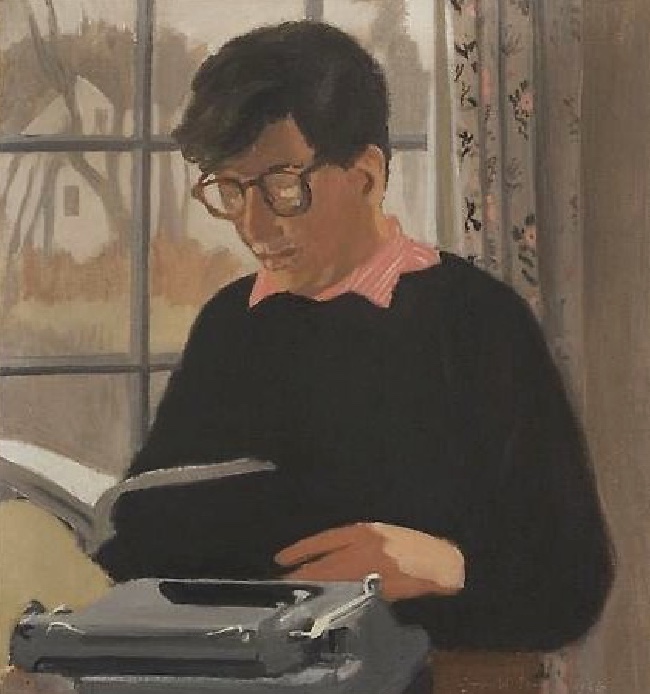“Write poetry as if you were in love. If you are always in love you will not always write the same poem, but if you are never in love you may.” ~ Kenneth Koch

Happy June! Here’s a little Kenneth Koch to nudge your nouns and activate your adjectives.
*

PERMANENTLY by Kenneth Koch One day the Nouns were clustered in the street. An Adjective walked by, with her dark beauty. The Nouns were struck, moved, changed. The next day a Verb drove up, and created the Sentence. Each Sentence says one thing -- for example, “Although it was a dark rainy day when the Adjective walked by, I shall remember the pure and sweet expression on her face until the day I perish from the green, effective earth.” Or, “Will you please close the window, Andrew?” Or, for example, “Thank you, the pink pot of flowers on the window sill has changed color recently to a light yellow, due to the heat from the boiler factory which exists nearby.” In the springtime the Sentences and the Nouns lay silently on the grass. A lonely Conjunction here and there would call, “And! But!” But the Adjective did not emerge. As the adjective is lost in the sentence, So I am lost in your eyes, ears, nose, and throat -- You have enchanted me with a single kiss Which can never be undone Until the destruction of language. ~ from Selected Poems, 1950-1982 (Vintage, 1985)

Charming, conversational, lighthearted, with quite a surprise at the end. Did you realize this was a love poem when you first started reading it? Love Koch’s disarming approach. 🙂
Perhaps, like me, you were delighted with how he cleverly personified the parts of speech, immediately drawing us in at the beginning with characters we’re more accustomed to diagramming than dallying with.
And what about the seemingly random things in the sample sentences? Are they connected in any way? Well, it was rainy when the Adjective walked by, so maybe that’s why Andrew was asked to close the window, which may or may not be the same window with the pink pot of flowers upon its sill. 🙂
But the real intrigue doesn’t come until we learn that “the Adjective did not emerge,” as she was “lost in the sentence.”
Good or bad?

Let’s assume the Nouns are male. Of course if a “dark beauty” walks by, they would be “struck, moved, changed.” It is a truth universally acknowledged that females have this power. They often “modify” the men they’re with. A man, after all, is ‘just’ a man until he becomes attached to the right Adjective.
Then he can become a funny man, a handsome man, a hungry man, perhaps even a brilliant man.
She will define, describe, or characterize him in one fell swoop (do we always have to do all the work?). 😀

But to be fair, in any relationship, both parties are usually changed. The Adjective, whether she’s funny, handsome, hungry, or brilliant, must also choose her Noun carefully. This could mean the difference between hooking up with handsome Colin or handsome Fabio. I’d take Colin, of course, as he’s a (now single) gentleman noun, and oh so proper. 🙂
By the time we get to the last stanza, Koch’s reveling in romantic dreamland. Enchanted with a single kiss? Oh, I am so lost in you! The Adjective will not emerge because two have become one.
Sigh.

Such is the way of true (adjective) love (abstract noun).
In fact, I love this poem, whose title — “Permanently” (adverb) — suggests that words, sentences, language, and a pronouncement of love in a single poem “can never be undone.” That’s my take, anyway. 🙂

One more sentence thing:
“A small bear thought it would be fitting to decorate this post with paintings by Koch’s good friends Jane Freilicher and Fairfield Porter so they could all be together again — permanently.” 🙂
*
The lovely and talented Margaret Simon is hosting the Roundup at Reflections on the Teche. Drop by to check out the full menu of poetic goodness being served up around the blogosphere this week. Enjoy your weekend!
*Copyright © 2021 Jama Rattigan of Jama’s Alphabet Soup. All rights reserved.


What fun! The small bear’s idea is brilliant. I love the art that punctuates this post. Lovely, Jama.
LikeLiked by 1 person
The small bear and I thank you, Linda!!
LikeLike
Parts of speech never left me so speechless! “And! But!” Koch’s poem and your analysis are brilliant, Jama! And hat tip to the small bear. 🙂
LikeLiked by 1 person
“OH!” *small bear does a little tap dance*
LikeLike
Thank you so much for this post! I started my poetic journey with Kenneth Koch’s books on teaching poetry, Wishes, Lies, and Dreams, and Rose, Where Did you get that Red? I have never (don’t know why) explored his poetry. I love your analysis “Such is the way of true (adjective) love (abstract noun).”
LikeLiked by 1 person
I’m just the opposite of you. I know some of Koch’s poetry, but haven’t read any of his teaching books. He was, by all accounts, a brilliant and beloved professor.
LikeLiked by 1 person
Like Margaret, I used Koch’s books early in my life, especially for teaching & I know this poem, Jama. I used to challenge my students to write love poems & this is one I shared with them. It pleased everyone to have that jolt at the end of love. It opens up the idea for young writers that poetry can be what you choose to make of it. Thanks for the extra & lovely art from Koch’s friends, too. Happy weekend!
LikeLiked by 1 person
Nice to hear you used his books with your students too. I like that his poems usually surprise me — but then he and his “New York School” cohorts were all about avoiding the constraints of formalist poetry.
LikeLiked by 1 person
Jama, what fun! I have learned a lot about Kenneth Koch today. My very first foray into teaching poetry was in 1985 when I found an old copy of Wishes, Lies, and Dreams. We wrote all kinds of poems like he did with P.S. 61.
I love the thinking and questioning you did as you read “Permanently” Wow! a fascinating question about the gender of the nouns and adjectives. Hmmm. Got me thinking.
I like reading this “lost in your eyes, ears, nose, and throat” knowing that additional adjectives weren’t needed. He was lost in them regardless, and yes, I agree–they have become one, whatever part of speech they are.
LikeLiked by 1 person
Good point — no need for adjectives at the end. I’ve heard a little about the work he did with P.S. 61, but haven’t seen Wishes, Lies, and Dreams. Need to fix that.
LikeLike
I absolutely ove Koch’s poem – the way it starts out so simply unassuming and then turns into a love poem. Utter genius.
LikeLiked by 1 person
Reading this poem is kind of like finding love when/where you least expect it.
LikeLike
Wow — the way the love poem emerges at the end of the sentences, while Koch has distracted the reader with playful part of speech… it feels kind of like the surprise and giddiness of falling in love.
LikeLiked by 1 person
Yes, so true! Giddy is a good way to describe it. 🙂
LikeLike
I so enjoyed this post – words and art! Thank you. I’m familiar with Rose, Where Did You Get That Red? but none of Koch’s other work. Think I will have to fix that.
LikeLiked by 1 person
Koch’s poetry is such a treat. Hope you read more of it soon. 🙂
LikeLike
The ending TOTALLY took me by surprise! I like the way you’ve parsed the meaning and paired the poem with paintings. Perfection!
LikeLiked by 1 person
Yes, Koch was pretty sneaky, and pulled off his surprise with aplomb. 🙂
LikeLike
Sigh, what a lovely post! Thank you, Jama – you always delight! And I love that Koch quote – that’s one to write down. Ruth, thereisnosuchthingasagodforsakentown.blogspot.com
LikeLiked by 1 person
I think Koch’s quote makes sense. 🙂
LikeLike
Jama I loved the poem on first read, but then your analysis made me love it (and you) all the more. Thank you!
LikeLiked by 1 person
Thanks, Sally!!
LikeLike
Yum what a delicious post, poets and painters! I love all you’ve curated here. Charming poem by Kenneth Koch, and this line takes me away, “The next day a Verb drove up, and created the Sentence.” Jane Freilicher and Fairfield Porter are two favorites of mine. Thanks for letting me get lost in this loveliness. BTW I’ve been reading Ninth Street Women, a little 700 plus page tome of a book–it focuses on 5 women who where also contemporaries of Freilicher, although more abstract. It’s going to be my bedside companion for a while… Thanks Jama!
LikeLiked by 1 person
Wow, that book sounds fascinating and will require persistence to get through. Nice to know you enjoy Porter’s and Freilicher’s work too. I like learning about how one art form inspires another, and how some of the NY School of Poets and Painters collaborated sometimes.
LikeLike
Like others, I was inspired by Wishes, Lies, and Dreams early in my teaching career. Thank you for sharing Koch’s delightful poem and for illustrating it so beautifully with Porter and Freilicher’s paintings. I’d like to dive into “Mallows” and spend the day there!
LikeLiked by 1 person
Yes, I know what you mean about “Mallows.” I need to take a look at Wishes, Lies, and Dreams.
LikeLike
Jama, this poem is so unassuming as a love poem yet it intrigued me to find its way to the ending. True Love wins all the time. Thank you for introducing me to Koch’s poetry.
LikeLiked by 1 person
Nothing mushy about it!! I love how Koch surprises us with this unexpected expression of love.
LikeLike
I loved eavesdropping on your conversation with this poem, Jama. I’ve read some of KK’s work recently but not this one. Thank you!
LikeLiked by 1 person
The more I read the poem, the more I noticed. It wasn’t such a simple lighthearted poem after all. 🙂
LikeLike